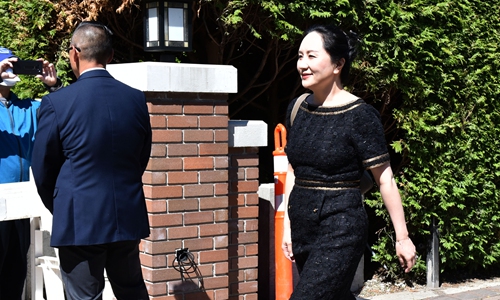HSBC could face legal consequences in China for colluding with US in Huawei: legal experts
By Chen Qingqing and Shen Weiduo Source:Global Times Published: 2020/6/16 21:43:40
Arguments show Canada, HSBC US 'accomplices'

Huawei Chief Financial Officer Meng Wanzhou leaves her Vancouver home on May 27, 2020 to appear in British Columbia Supreme Court. Photo: AFP
New arguments raised by lawyers for Huawei Chief Financial Officer Meng Wanzhou in Canada further indicate that London-based lender HSBC was an accomplice of the US in Meng's case.
These arguments, if proven, mean that HSBC could face legal consequences, as well as a backlash from businesses and the public in China, for its role in the US' relentless crackdown on the Chinese high-tech giant, experts said.
The arguments, which claim that US authorities made reckless misstatements and omissions about a key presentation the Huawei senior executive delivered to HSBC, has also further proved that Meng's probe is a purely political maneuver rather than a legal case, said legal experts. They noted that if the "decisive" argument could be proved, Meng should be set free immediately.
On Tuesday (Beijing time), in a bid to fight extradition to the US, lawyers for Meng raised a new argument in a memo filed to the Supreme Court of British Columbia, saying that Meng had been falsely accused and claiming the US misrepresented and ignored details of a crucial presentation Meng gave to HSBC.
The presentation - which was later handed over to the US Department of Justice (DOJ) by HSBC, and which the DOJ alleges contained "numerous misrepresentations" - played a key role in the US charges against Meng.
The memo also indicated that HSBC may have known about Huawei's relationship with Skycom long before - meaning the so-called bank fraud charge can't be established, Yue Dongxiao, a US-based lawyer who is closely observing the case, told the Global Times on Tuesday.
"Meng could be set free if the document could be admitted into evidence," Yue said.
The memo included material omissions in the PowerPoint presentation delivered by Meng to an HSBC banker in 2013, which were "grossly misleading." As the slides are the foundation for the fraud allegations against Meng, "such omissions constitute, at best, gross negligence by the Requesting State in ensuring that the certified ROC/SROC accurately summarized the relevant facts and evidence available for trial and, at worst, an intentional effort to mislead," the memo read.
The memo also included misstatements about "junior/senior employees of HSBC. On the abuse motion, Meng will seek to adduce evidence that will demonstrate that these statements in the Record of the Case are false.
Since Meng was arrested in December 2018 by Canadian police at the request of the US during a flight stopover in Canada, there have been several rounds of extradition hearings. Last month, a ruling by a Canadian court left Meng under detention in Canada.
Describing Canada's latest ruling as completely surrendering its self-proclaimed judicial and diplomatic independence to US bullying, legal experts and the media also found that previous legal documents indicate that HSBC set a trap for Meng as the bank had its own issues (a money-laundering scandal in Mexico) in the face of US sanctions.
In such a case, the bank could be considered as an "agent" of the US government that did the dirty work to guarantee its "safety," a source close to the matter said, adding that putting itself into a geopolitical battle has created its own problems for HSBC.
"The fact that HSBC would actually benefit from selling out Meng would also be dispositive of the fraud claim, for there would be no damages resulting from HSBC's purported reliance on Meng's statements," Yue said.
Industry insiders noted that if the multinational bank, which generates almost 80 percent of its profits from China, was proven to have "betrayed" Huawei, it should be prepared for "harsh punishment" in China, such as being put on the country's "unreliable entity list."
"While relying on the China market for business, HSBC is disregarding the interests of Chinese customers, distorting information from Huawei and the words of Huawei executives to the US government. If Huawei sues HSBC in China, it is perfectly reasonable," an industry insider surnamed Li told the Global Times on Tuesday.
More evidence related to the case has emerged and proven the innocence of Meng, Shen Yi, the director of the Research Center for Cyberspace Governance at Fudan University, said. But if Canada blindly yielded to the US, the new argument, even if proven true, will also be useless, said Shen.
"Evidence only works for 'legal cases' rather than political ones," Shen told the Global Times on Tuesday.
Foreign Ministry spokesperson Zhao Lijian said on Monday that arresting Meng was a completely political maneuver, exposing US' political plot to deliberately suppress Huawei and Chinese high-tech enterprises, and it showed that Canada had played the role of an accomplice to the US.
"We once again urge the Canadian side to take seriously China's solemn position and concerns, immediately release Meng Wanzhou, and let her return to China safely," Zhao added. "Don't go too far down the wrong path," Zhao added.
"Canada and China enjoyed a close relationship both in terms of trade and people-to-people exchanges before Meng's arrest. But now, especially after the [new court document], we have more reasons to take retaliatory measures against Canada," Mei Xinyu, a research fellow at the Ministry of Commerce's Chinese Academy of International Trade and Economic Cooperation, told the Global Times.
Newspaper headline: New memo should free Meng
Posted in: DIPLOMACY